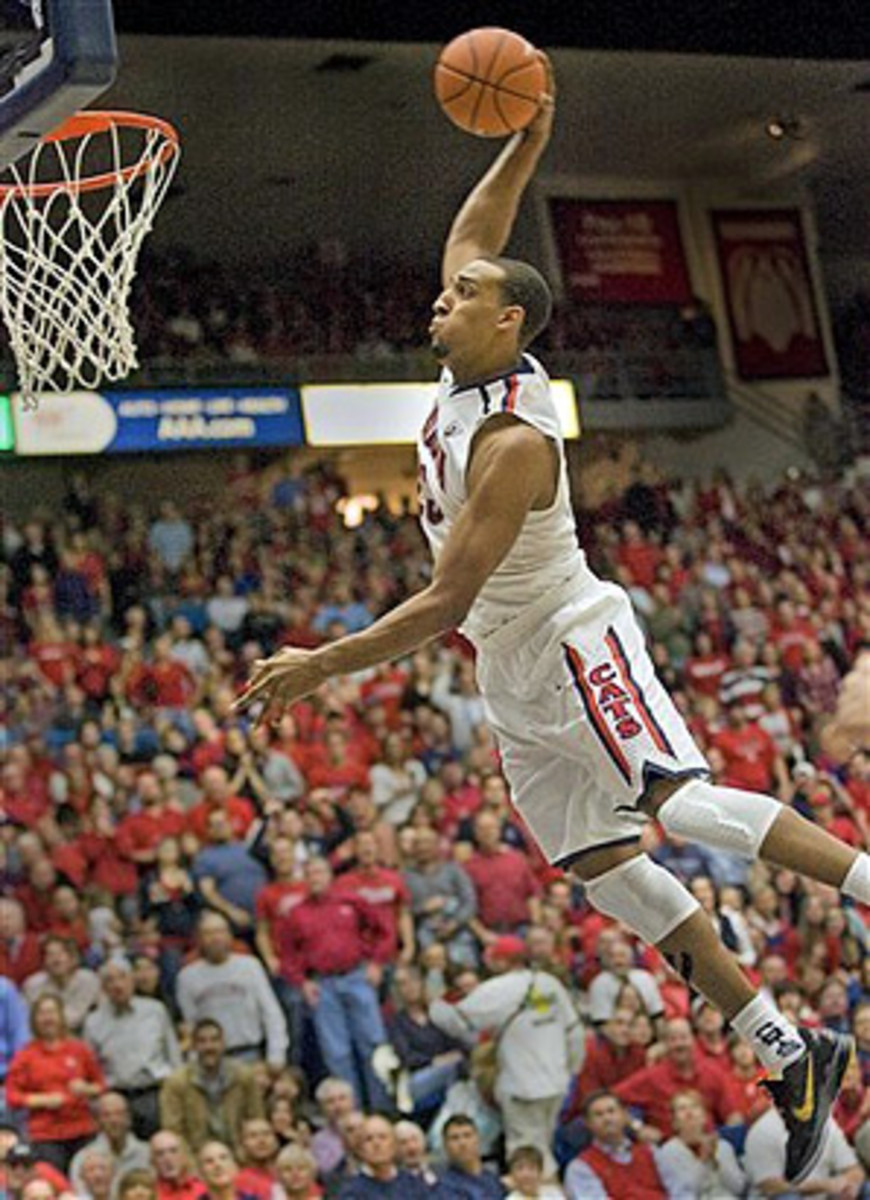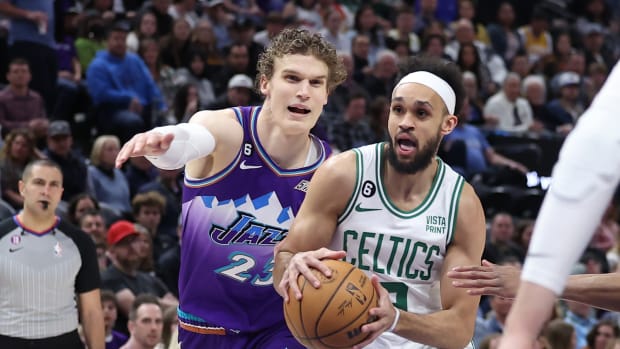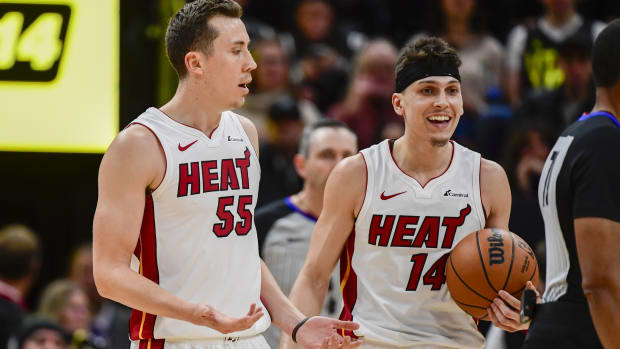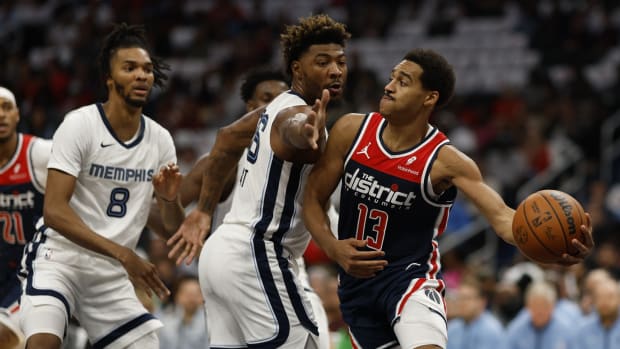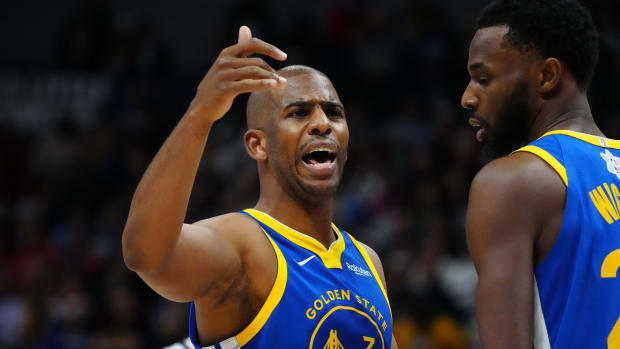Q&A with Derrick Williams
Last season, as BYU's Jimmer Fredette and UConn's Kemba Walker were becoming household names and Duke's Kyrie Irving was being touted as the next NBA star despite limited playing time, Arizona's Derrick Williams was quietly lighting up scoreboards and reaching near historic heights for efficiency in the process. Unheralded as a three-star recruit out of California's La Mirada High School, Williams had always seemed to slip through basketball's cracks, even after earning Pac-10 Player of the Year honors and leading the Wildcats to the 2011 regular-season conference title. But, as so often is the case, the NCAA tournament was a coming-out party. His block sealed Arizona's first-round victory against Memphis, and his late three-point play against Texas pushed the Wildcats into the Sweet 16. By the time Williams almost single-handedly dismantled Duke with 32 points (including 5-of-6 from three-point range) and 13 rebounds, everyone knew his name.
Now that scouts have seen his impressive range and athleticism, the 6-foot-8, 248-pound Williams is a likely top three pick in Thursday's NBA draft. He spoke recently with SI.com about turning pro after his sophomore season, drawing motivation from his mom's wisdom and finding a position in an NBA frontcourt.
SI.com: Why was it time to come out of college?
Williams: I felt I had a good year. We've had only four 30-win seasons in Arizona history so I thought that was a big accomplishment. So was being able to win the Pac-10 title for the first time in six years. We made the Elite Eight and were two points away from the Final Four and obviously everybody wants to win an NCAA championship, but it's not guaranteed. We did have a great team coming back, but I felt, with the support of my family and my team, it was my time to leave.
SI.com: How hard was it to leave Arizona?
Williams: It was really hard. That's why I took so long to decide. I waited about a week and a half before the actual deadline while the others entered their names. I really liked Arizona, from the school to the fans and basketball. I really didn't want to let anybody down from my leaving. I love when Arizona fans all over the country come up to me and say, "Oh, you're number 23." Whether they watch much basketball or not, they say they're real proud. They won't always remember your face, but they remember what you did. That really brings me happiness and joy. That's why I play basketball. I still had a lot of business I wanted to take care of, like winning a championship, but like I said, it's not guaranteed. That's why it was so hard to leave.
SI.com: How did your family support you decision to leave?
Williams: Normally outside people affect your decision, but my mom told me, "Make sure it's your decision to leave and not anybody else telling you to leave." I really took that to heart and trusted her. At the end of the day, my mom didn't pick my school, what college I went to, she didn't pick for me to go to the NBA. I think a lot of parents really choose for their kids. My mom made me decide and she always went with it. I think when you have a parent like that, that's always 100 percent behind whatever move you make, it's really good.
SI.com: What other advice has she given you over the years?
Williams: She told me that there's always someone out there working who wants to beat you. Someone is always out to prove why they're better than you. When she told me that, it really hit hard. I knew I needed to get in the gym and keep working to be where I want to be. If you're already satisfied with your play, there's no room for growth. I think I have a lot of growth left in me and hopefully I can keep getting better every time I'm out there.
SI.com: What have you done this offseason to get better?
Williams: A lot of people thought shooting over 50 percent on three-pointers last season was a fluke. I've been working to prove I can shoot and also play and guard multiple spots. Being able to do those things and create mismatches and being able to put the ball on the floor is what is going to separate me from a lot of people and prove people wrong.
SI.com: Where do you see yourself fitting into an NBA rotation?
Williams: I'll probably stay as a big 3 [small forward]. A lot of people would say I have no position; I'm just a basketball player. I really have the best of both worlds right now, using my speed and quickness against bigger players and my size against smaller guys. If they put me at the 3, being able to defend a 3 is going to be good for me because of my size and my strength. Being 6-8, 6-9, 250, it's pretty hard for a player to go by me. If they put me at the 4 [power forward], bigger players really can't step outside. Whatever position it is I'm going to play it, work hard and try to do my best.
SI.com: What NBA player do people often compare you to?
Williams: A lot of people are saying I'm a Mike Beasley type because he's labeled as that swinger who can play a 3, a 4. I agree with that a little, but I don't really try to fit my game around who I play like. I just get out there and play. I like to shoot a little more where [Beasley] likes to drive to the basket. I get fouled a lot going to the basket, but being able to shoot outside gives me a little bit of an advantage right there.
SI.com: How will you ultimately measure your success?
Williams: A lot of people said I wasn't good enough to be a Division I player, but I made it. As soon as I got there, I just wanted to be drafted to the NBA. Right now, I'm exceeding those goals. Most people have me as a top five pick. Success, to me, is always trying to reach goals. A lot of people think it's crazy, but I just set my goals really high so I work just that much harder. Even if I don't reach them, I'm still going to accomplish a lot just by aiming high. That's what I've done my whole career.






























